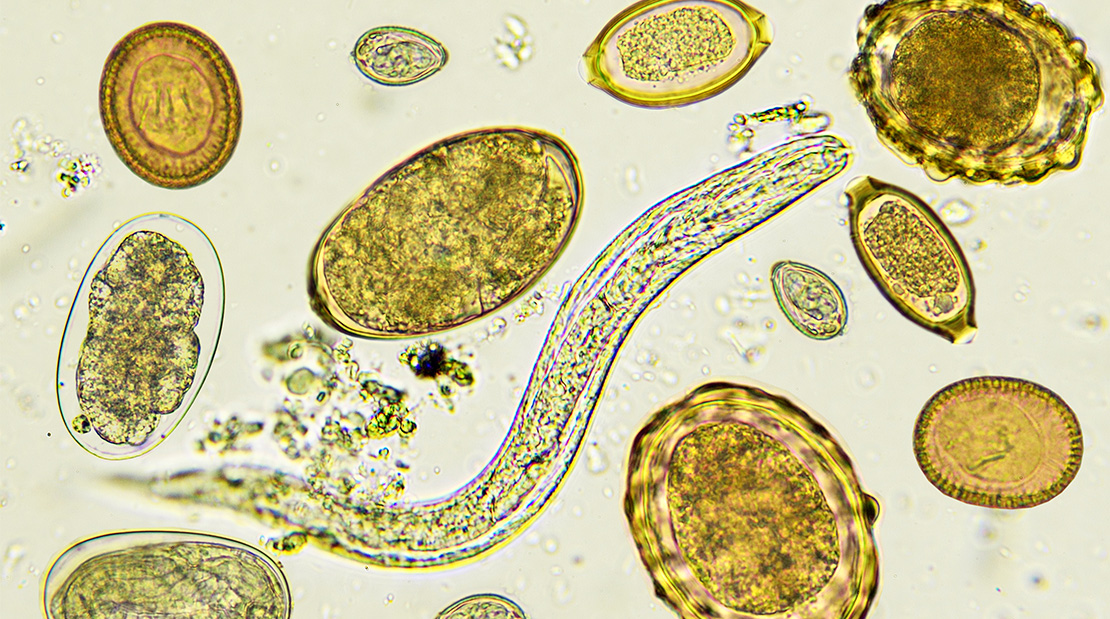
Protecting Your Pets from Parasites
I’m not a parasitologist, but because I have a passion for veterinary medicine, I have a passion for parasitology as well! Parasites are living organisms that happen to live off of the lifecycle of another being, but they can cause some nasty and unwanted effects in the lives of our pets.
It’s important to know the most common parasites we see at CyFair Animal Hospital and how you can keep everyone in your household healthy and safe from these unwanted visitors.
Hookworms & Roundworms
Hookworms and roundworms are some of the most common parasites in pets. If you own a cat or dog, always assume your pet is dealing with these two parasites because they are so prevalent and easily transmitted.
The transmission of these parasites usually occurs from mother to offspring, either through the placenta or the mother’s milk. They often remain dormant until the animal’s immune system is compromised and cause symptoms like anemia and gastrointestinal issues like vomiting or diarrhea.
Whipworms, Tapeworms, Giardia and Coccidia
Whipworms, tapeworms, giardia, and coccidia are other frequent culprits in parasitic infections. While whipworms are exclusive to dogs, other parasites can also affect cats These gastrointestinal parasites can be detrimental to the health of your cat or dog by robbing them of essential vitamins and nutrients, leading to health issues and developmental problems, especially in young animals.
Giardia and coccidia can also cause foul-smelling and severe diarrhea and vomiting, which can lead to painful rectal prolapse, dehydration, and, in extreme cases, Psuedo-Addison’s Disease. This disease process belongs to whipworms which can be deadly.
You may be able to spot some types of worms in your cat or dog’s vomit and feces. Additionally, you may notice their larvae may appear to look like a small grain of rice or maggot on or near their rectum.
Heartworm
As a particularly sneaky and dangerous parasite, heartworm is a silent assassin. Because it’s transmitted through mosquitoes, it poses a risk to both dogs and cats but mainly dogs. all pets, even those rarely leaving the house. Symptoms often manifest once the disease has progressed significantly, which makes early detection difficult without testing.
Left untreated, heartworm can lead to severe health problems and can even be fatal. One of the first symptoms we see in dogs and cats with heartworm is fatigue and an inability to exercise. Though this could be a symptom of many other issues, if you notice these symptoms in your pet, you should see a veterinarian as soon as possible. Heartworm treatment is intensive and involves several injections, oral medication, and X-rays over 60-90 days. Note there is no treatment for cats and is often fatal.
External Parasites – Fleas, Ticks, Lice & Mites
External parasites like fleas, lice, and mites can cause discomfort and health issues that harm your pet’s well-being. These are typically contracted through contact with other animals or from the environment.
Common symptoms include persistent scratching, crusting around the ears, and changes to the pet’s coat. Though rarely deadly, these parasites can cause anemia and can be agonizing to experience.
Ticks are external parasites that can be exceptionally dangerous as they can transmit diseases like Rocky Mountain Spotted Fever and Lyme Disease. These diseases can be life-threatening to both pets and humans if left untreated. You can prevent infectious diseases caused by ticks by using preventative flea and tick oral or topical medications and thoroughly checking yourself and your dog after outdoor activities.
Pet Parasites Pose Risks for Humans
It’s important to note that not only are parasites dangerous for our pets, but many parasites can also be passed to other species, including humans.
Parasites can be hazardous to specific groups like older people, those with immunodeficiencies, and children and babies not equipped with immune systems capable of fighting the diseases they bring. Hookworms, roundworms, tapeworms, and giardia are parasites that can travel from your dog or cat to the people in a home, causing severe health issues.
Not only can these parasites be passed through direct contact, but they can also be passed through fomites, objects that can carry a parasitic infection. Fomites include flooring and carpet, utensils, toys, or even the bottom of your shoe. Parasites can find their way into your home in several ways, and taking preventative measures can protect the health of both your pet and your family.
Prevention is Key
While vaccines can protect against many harmful viruses and bacteria, regular checks and preventative medications for parasites are crucial, too. You should visit a veterinarian at least annually (and preferably bi-annually) for examinations of blood, urine, and fecal samples to detect the presence of parasites. We recommend a KeyScreen test to check not only for signs of parasites but also the exact DNA of the parasite to gauge zoonotic potential.
At Cyfair Animal Hospital, we believe preventative care should be accessible to all pet owners, so we prioritize affordable and convenient preventative medication options. These treatments include annual heartworm injections and all-in-one monthly orals or topicals to prevent mites, fleas, ticks, and GI parasites.
We can deliver these preventative measures to your home via mail our online pharmacy, making it easier for you to safeguard your pets against parasitic infections. By staying on top of prevention, you can protect your pets and your family from the harmful effects of parasites.

